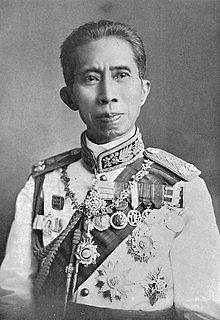Narisara Nuwattiwong
| Chitcharoen จิตรเจริญ |
|||||
|---|---|---|---|---|---|
| Prince of Siam | |||||
 |
|||||
| Minister of Treasury | |||||
| In office | 21 March 1892 – 23 December 1894 | ||||
| Predecessor | Chaturonrasmi | ||||
| Successor | Srisiddhi Thongjaya | ||||
| Minister of War | |||||
| In office | 1894 – 1899 | ||||
| Predecessor | Phum Srichaiyant | ||||
| Successor | Thongkhongkonhyai | ||||
| Born |
28 April 1863 Grand Palace, Bangkok, Siam |
||||
| Died | 10 March 1947 (aged 83) Bangkok, Siam |
||||
| Spouse | Mom Ratchawong Pluem Siriwong Mom Malai Sewatam Mom Ratchawong To Ngon-rot |
||||
| Issue |
See list
|
||||
|
|||||
| House | Chitrabhongse family (Chakri Dynasty) | ||||
| Father | Mongkut (Rama IV) | ||||
| Mother | Phannarai | ||||
| Full name | |
|---|---|
| His Royal Highness Prince Chitcharoen, The Prince Narisara Nuwattiwong |
Prince Narisara Nuwattiwong (Thai: นริศรานุวัดติวงศ์rtgs: Naritsaranuwattiwong; 28 April 1863 – 10 March 1947), Prince Naris for short, né Chitcharoen (จิตรเจริญ), was a member of the royal family of Siam (now Thailand), minister, general and scholar. He was known for his artistic talents, and was a key figure in Thailand's industrial revolution during the reign of Rama V.
Prince Narisara Nuwattiwong was born on 28 April 1863 in Bangkok, Thailand. He was the son of Pannarai and King Rama IV (also known as King Mongkut). Prince Nuwattiwong was educated by Western missionaries who encouraged his interest in the fine arts.
Prince Narisara Nuwattiwong was appointed as the Director of Public Works, Town and Country Planning for the Ministry of the Interior. He worked on Thailand's early urban planning and became an Art Advisor for the Royal Institute of Thailand. His other jobs included working for the Ministry of the Treasury, the Ministry of War, and the Ministry of the Palace. From 1892 to 1894, he served as Minister of the Treasury.
From 1894 to 1899, he was the Minister of War. During his tenure, the former Kalahom department (dating back to the 15th century) was radically modernised based on Western models. From 1896 to 1899, Prince Naris—who was both a general of the army and an admiral—additionally held the position of the Commander of the Department of Military Operation, the highest military position in the Siamese Army of that time. From 1898 to 1899 he was also the Commander of the Navy Department and therefore commanding officer of the Siamese Navy.
...
Wikipedia
